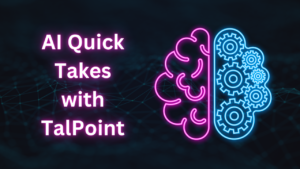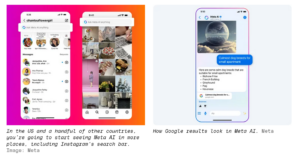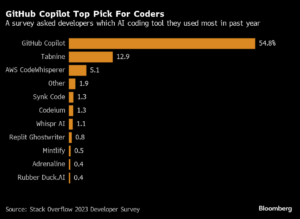Published: April 19, 2024
By TalPoint Marketing weekly wrap up

Your weekly source for news and updates on all things AI.
Looking for more regular updates from TalPoint? Follow us on Linkedin, Twitter, or visit us at TalPoint.com.
Read time: under 4 minutes
Meta’s battle with ChatGPT begins now

Meta is making waves in the AI landscape with the unveiling of Llama 3, the latest iteration of its open-source AI model. Designed to revolutionize the capabilities of AI assistants, Llama 3 promises to redefine the way people interact with technology. Here’s what you need to know:
Enhanced Performance: Llama 3 represents a significant leap forward in AI technology, offering unparalleled performance in comparison to its predecessors and competitors. With advanced algorithms and state-of-the-art architecture, Llama 3 excels in a wide range of tasks, from natural language processing to coding assistance.
Superior Versatility: One of the key strengths of Llama 3 lies in its versatility. Whether you’re seeking assistance with everyday tasks, complex problem-solving, or creative endeavors, Llama 3 is equipped to meet your needs. Its robust capabilities make it an indispensable tool for individuals, businesses, and developers alike.
Seamless Integration: Llama 3 seamlessly integrates into Meta’s ecosystem of platforms, including Instagram, Facebook, WhatsApp, and Messenger. This integration enables users to access Llama 3’s powerful features directly within their favorite apps, streamlining the user experience and enhancing accessibility.
Strategic Maneuvers: Introducing an open-source model comparable to GPT-4 isn’t merely about boosting Meta’s product adoption. It also applies pressure on companies relying on closed models like OpenAI, safeguarding Meta’s position against potential challengers in the future.
Microsoft’s AI Copilot Is Starting to Automate the Coding Industry
Revolutionizing Software Development: Copilot is reshaping the software development landscape by revolutionizing the way engineers write code. Nikolai Avteniev, a software developer at StubHub, shares his experience: “Instead of using 15 keystrokes, it took three. It was a nice little speed boost.” This sentiment is echoed by Aaron Hedges, a developer at ReadMe, who appreciates Copilot’s auto-complete function for its efficiency: “I can look at that and go, ‘Oh yeah, that looks right.'”

Challenges and Limitations: While Copilot offers significant benefits, it’s not without its challenges and limitations. GitHub acknowledges concerns such as outdated suggestions and potential security vulnerabilities. Thomas Dohmke, CEO of GitHub, emphasizes the need for caution: “The social dynamic of the team will make sure that those that are cheating by accepting code too fast… will not make it into production.”
The Future of AI in Coding: AI-assisted coding holds promise for the future of software development, with the potential to automate large portions of the process. Mei Nagappan, a computer science professor, compares the current state of AI in coding to “driver assist” technology, noting its potential for augmentation rather than replacement. However, there are ongoing debates about its long-term impact on the role of software engineers and the industry as a whole. As AI continues to evolve, GitHub is continuously enhancing Copilot’s capabilities. Abhishek Mathur, vice president of engineering at Figma, highlights the value of AI: “It doesn’t replace our work, but frees up our time to develop creative solutions.”
AI now beats humans at basic tasks — new benchmarks are needed

The recently released Artificial Intelligence Index Report 2024 by Stanford University’s Institute for Human-Centered Artificial Intelligence highlights significant advancements in machine learning systems over the past decade. It emphasizes the growing need for innovative approaches to evaluating AI, particularly in assessing complex tasks like abstraction and reasoning. Nestor Maslej, Stanford’s social scientist and the AI Index’s editor-in-chief, notes the rapid pace of change, with benchmarks becoming obsolete in just a few years.
The annual AI Index, compiled by a team of experts, provides a comprehensive assessment of technical advancements, costs, ethics, and more, catering to researchers, policymakers, and the public. This year’s report, exceeding 400 pages and refined with AI tools, underscores the rising regulation of AI in the United States but flags the absence of standardized assessments for responsible AI use. Additionally, it highlights AI’s increasing integration into scientific endeavors, showcasing projects like Graph Networks for Materials Exploration (GNoME) and GraphCast from Google DeepMind, aiding material discovery and rapid weather forecasting.
Microsoft Makes High-Stakes Play in Tech Cold War With Emirati A.I. Deal

Microsoft announced a $1.5 billion investment in G42, an AI giant in the UAE, in a move facilitated by the Biden administration to counter China’s technological influence in the Persian Gulf. Under the agreement, G42 gains permission to sell Microsoft services utilizing powerful AI chips, while Microsoft gains access to G42’s cloud services and ensures a security arrangement with the US government. The partnership aims to safeguard AI intellectual property and restrict Chinese involvement in G42’s operations. The deal reflects US concerns about protecting vital technology and could potentially limit China’s influence in the region.
The agreement signals a strategic move by the US to prevent China’s access to advanced AI technology, critical for national security. It also highlights the UAE’s efforts to become a major player in AI, with G42 deeply embedded in the Emirati security state. However, concerns persist about G42’s ties to China, with bipartisan US committees urging scrutiny over its connections to Chinese military advancement and surveillance. Despite steps to sever some ties, questions remain about G42’s relationship with China, underscoring ongoing challenges in managing technology partnerships amidst geopolitical tensions.

LangAI: Fully immerse yourself in a new language by chatting or speaking to an AI.
———————————————————————————————————————————————————————————————————————————————————————————-
Thanks for reading. Until next weekend!
For questions and feedback, email us at marketing@talpoint.com. We would love to hear from you.